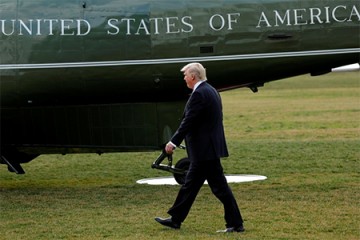Sea metaphors abound in Eliot Cohen's commentary, published today in The Atlantic, about the future of the presidency of Donald Trump.

Image caption: Eliot Cohen
Cohen, a former State Department counselor and a professor of strategic studies at the Johns Hopkins University School of Advanced International Studies in Washington, D.C., likens the U.S. to a ship, and Trump to the captain. He sees two possibilities for the future: Either the president relinquishes control of the ship by "conced[ing] the direction of foreign policy" to his cabinet secretaries; or the ship itself is "in serious trouble." The latter, he argues, is the far more likely outcome.
He points to two problems, the first of which is the controversy surrounding embattled national security adviser, Michael Flynn, who resigned late Monday.
"Since World War II, the United States has evolved a system for making foreign policy that depends on an effective White House operation in the form of the National Security Council staff," Cohen writes. "The elaborate hierarchy of interagency committees that evolved actually works rather well most of the time, but it depends critically on the ability of a competent staff working directly for the president to orchestrate it."
Also see
Cohen, a frequent Trump critic, also suggests that a conflict of personalities—between White House senior aides and officials and the president himself—is also probable. He sees a series of disparate circles of foreign policy influence emerging within the upper echelons of the White House, including the national security council staff (which he calls "paralyzed"); White House Chief Strategist Steve Bannon; Jared Kushner, the president's son-in-law and senior adviser; and possibly the offices of the Vice President and White House Chief of Staff.
"Trump seems to like this arrangement, which is not only confusing but built for serious conflict," Cohen says.
More from The Atlantic:
Read more from The AtlanticThe optimistic theory could prove true, if Trump appoints a forceful national security adviser and diminishes Bannon's and Kushner's roles. It is more likely, however, that the White House will be the scene of knife fights below decks and shouted orders and counterorders on the quarterdeck. And at the end of the day, Trump, like Captain Ahab, will probably remain topside, pursuing whatever Moby Dick his imagination has just conjured up. That story did not end particularly well for all aboard.
Posted in Voices+Opinion, Politics+Society
Tagged foreign policy, eliot cohen, donald trump











